新概念英语第二册笔记-第20课
- 格式:doc
- 大小:34.00 KB
- 文档页数:5
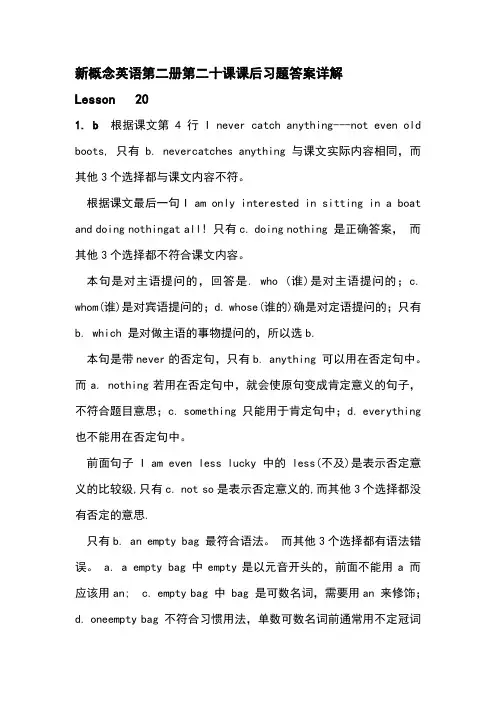
新概念英语第二册第二十课课后习题答案详解Lesson 201. b根据课文第4行 I never catch anything---not even old boots, 只有 b. nevercatches anything 与课文实际内容相同,而其他3个选择都与课文内容不符。
根据课文最后一句I am only interested in sitting in a boat and doing nothingat all! 只有c. doing nothing 是正确答案,而其他3个选择都不符合课文内容。
本句是对主语提问的,回答是. who (谁)是对主语提问的;c. whom(谁)是对宾语提问的;d. whose(谁的)确是对定语提问的;只有b. which 是对做主语的事物提问的,所以选b.本句是带never的否定句,只有b. anything 可以用在否定句中。
而a. nothing若用在否定句中,就会使原句变成肯定意义的句子,不符合题目意思;c. something 只能用于肯定句中;d. everything 也不能用在否定句中。
前面句子 I am even less lucky 中的 less(不及)是表示否定意义的比较级,只有c. not so是表示否定意义的,而其他3个选择都没有否定的意思.只有b. an empty bag 最符合语法。
而其他3个选择都有语法错误。
a. a empty bag 中empty是以元音开头的,前面不能用a 而应该用an; c. empty bag 中 bag 是可数名词,需要用an 来修饰;d. oneempty bag 不符合习惯用法,单数可数名词前通常用不定冠词a 或an 修饰,除非表示强调才用one 修饰。
因此应该选b.只有c. all 才能使这个句子同前一句I am only interested in doingnothing.的含义相符合,all等于the things that ,可以代替doing nothing. 而其他3个选择中a. only 和d. the only 不符合语法,b. the one 不符合题目意思,不能完全表达清楚。
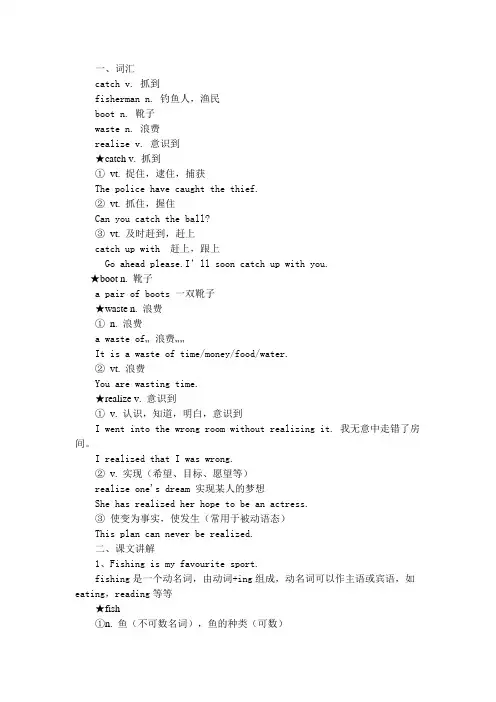
一、词汇catch v. 抓到fisherman n. 钓鱼人,渔民boot n. 靴子waste n. 浪费realize v. 意识到★catch v. 抓到①vt. 捉住,逮住,捕获The police have caught the thief.②vt. 抓住,握住Can you catch the ball?③vt. 及时赶到,赶上catch up with 赶上,跟上Go ahead please.I’ll soon catch up with you.★boot n. 靴子a pair of boots 一双靴子★waste n. 浪费①n. 浪费a waste of… 浪费……It is a waste of time/money/food/water.②vt. 浪费You are wasting time.★realize v. 意识到①v. 认识,知道,明白,意识到I went into the wrong room without realizing it. 我无意中走错了房间。
I realized that I was wrong.②v. 实现(希望、目标、愿望等)realize one's dream 实现某人的梦想She has realized her hope to be an actress.③使变为事实,使发生(常用于被动语态)This plan can never be realized.二、课文讲解1、Fishing is my favourite sport.fishing是一个动名词,由动词+ing组成,动名词可以作主语或宾语,如eating,reading等等★fish①n. 鱼(不可数名词),鱼的种类(可数)There are a lot of fishes(表示种类)in the sea.②v. 钓鱼, 捕鱼2、I often fish for hours without catching anything.for+时间表示一段时间for hours=for some hours 数小时without catching anything作为状语而出现, 表示结果状语。
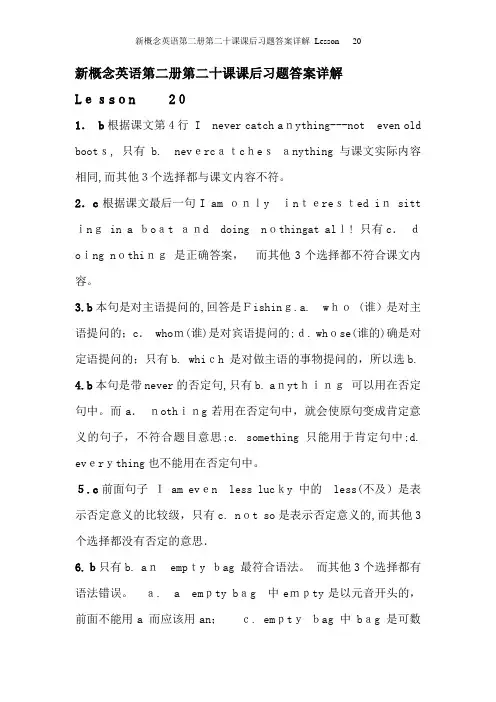
新概念英语第二册第二十课课后习题答案详解Lesson 201. b根据课文第4行 I never catch anything---not even old boots, 只有 b. nevercatchesanything 与课文实际内容相同,而其他3个选择都与课文内容不符。
2.c根据课文最后一句I am only interested in sitting in a boat and doing nothingat all! 只有c.doing nothing是正确答案,而其他3个选择都不符合课文内容。
3.b本句是对主语提问的,回答是Fishing.a. who (谁)是对主语提问的;c. whom(谁)是对宾语提问的;d. whose(谁的)确是对定语提问的;只有b. which 是对做主语的事物提问的,所以选b.4.b本句是带never的否定句,只有b. anything可以用在否定句中。
而a.nothing若用在否定句中,就会使原句变成肯定意义的句子,不符合题目意思;c. something 只能用于肯定句中;d.everything也不能用在否定句中。
5.c前面句子I am even less lucky 中的less(不及)是表示否定意义的比较级,只有c. not so是表示否定意义的,而其他3个选择都没有否定的意思.6.b只有b. anempty bag 最符合语法。
而其他3个选择都有语法错误。
a. a empty bag 中empty是以元音开头的,前面不能用a 而应该用an;c. emptybag 中 bag 是可数名词,需要用an 来修饰; d. oneempty bag 不符合习惯用法,单数可数名词前通常用不定冠词a 或an 修饰,除非表示强调才用one修饰。
因此应该选b.7.c只有c. all 才能使这个句子同前一句I am only interest ed in doingnothing.的含义相符合,all等于the things t hat ,可以代替doing nothing. 而其他3个选择中a. only 和d.the only 不符合语法,b. the one 不符合题目意思,不能完全表达清楚。
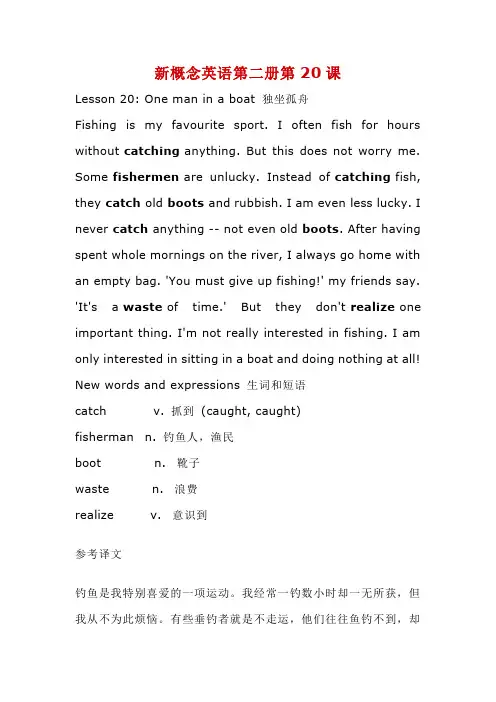
新概念英语第二册第20课Lesson 20: One man in a boat 独坐孤舟Fishing is my favourite sport. I often fish for hours without catching anything. But this does not worry me. Some fishermen are unlucky. Instead of catching fish, they catch old boots and rubbish. I am even less lucky. I never catch anything -- not even old boots. After having spent whole mornings on the river, I always go home with an empty bag. 'You must give up fishing!' my friends say. 'It's a waste of time.' But they don't realize one important thing. I'm not really interested in fishing. I am only interested in sitting in a boat and doing nothing at all! New words and expressions 生词和短语catch v. 抓到(caught, caught)fisherman n. 钓鱼人,渔民boot n. 靴子waste n. 浪费realize v. 意识到参考译文钓鱼是我特别喜爱的一项运动。
我经常一钓数小时却一无所获,但我从不为此烦恼。
有些垂钓者就是不走运,他们往往鱼钓不到,却钓上来些旧靴子和垃圾。
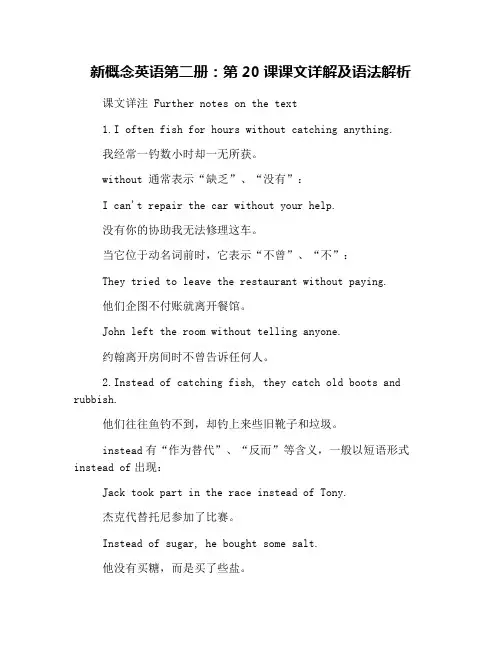
新概念英语第二册:第20课课文详解及语法解析课文详注 Further notes on the text1.I often fish for hours without catching anything.我经常一钓数小时却一无所获。
without 通常表示“缺乏”、“没有”:I can't repair the car without your help.没有你的协助我无法修理这车。
当它位于动名词前时,它表示“不曾”、“不”:They tried to leave the restaurant without paying.他们企图不付账就离开餐馆。
John left the room without telling anyone.约翰离开房间时不曾告诉任何人。
2.Instead of catching fish, they catch old boots and rubbish.他们往往鱼钓不到,却钓上来些旧靴子和垃圾。
instead有“作为替代”、“反而”等含义,一般以短语形式instead of出现:Jack took part in the race instead of Tony.杰克代替托尼参加了比赛。
Instead of sugar, he bought some salt.他没有买糖,而是买了些盐。
副词instead单独使用时一般出现在句尾:If you don't want a holiday in England, why don't you go to Australiainstead?如果你不想在英国度假,那你为什么不去澳大利亚呢?3.I am even less lucky.我的运气甚至还不及他们。
less是little的比较级,意为“不及”、“不如”、“更少”:Tom has got little chocolate, and Jack has got even less.汤姆只有一点儿巧克力,杰克则更少。
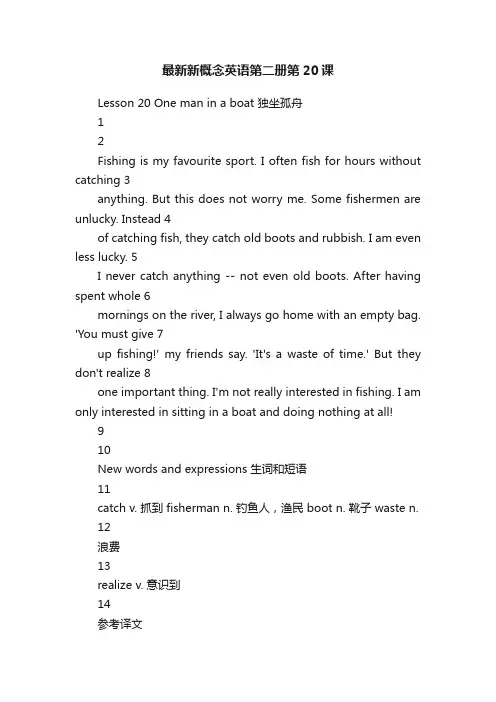
最新新概念英语第二册第20课Lesson 20 One man in a boat 独坐孤舟12Fishing is my favourite sport. I often fish for hours without catching 3anything. But this does not worry me. Some fishermen are unlucky. Instead 4of catching fish, they catch old boots and rubbish. I am even less lucky. 5I never catch anything -- not even old boots. After having spent whole 6mornings on the river, I always go home with an empty bag. 'You must give 7up fishing!' my friends say. 'It's a waste of time.' But they don't realize 8one important thing. I'm not really interested in fishing. I am only interested in sitting in a boat and doing nothing at all!910New words and expressions 生词和短语11catch v. 抓到 fisherman n. 钓鱼人,渔民 boot n. 靴子 waste n.12浪费13realize v. 意识到14参考译文钓鱼是我特别喜爱的一项运动。
我经常一钓数小时却一无所获,但我从不为1516此烦恼。
有些垂钓者就是不走运,他们往往鱼钓不到,却钓上来些旧靴子和垃17圾。
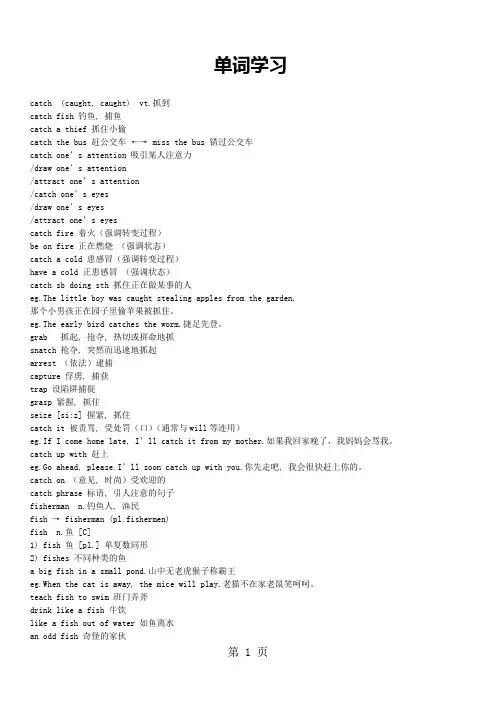
单词学习catch (caught, caught) vt.抓到catch fish 钓鱼, 捕鱼catch a thief 抓住小偷catch the bus 赶公交车←→ miss the bus 错过公交车catch one’s attention 吸引某人注意力/draw one’s attention/attract one’s attention/catch one’s eyes/draw one’s eyes/attract one’s eyescatch fire 着火(强调转变过程)be on fire 正在燃烧(强调状态)catch a cold 患感冒(强调转变过程)have a cold 正患感冒(强调状态)catch sb doing sth 抓住正在做某事的人eg.The little boy was caught stealing apples from the garden.那个小男孩正在园子里偷苹果被抓住。
eg.The early bird catches the worm.捷足先登。
grab 抓起, 抢夺, 热切或拼命地抓snatch 抢夺, 突然而迅速地抓起arrest (依法)逮捕capture 俘虏, 捕获trap 设陷阱捕捉grasp 紧握, 抓住seize [si:z] 握紧, 抓住catch it 被责骂, 受处罚(口)(通常与will等连用)eg.If I come home late, I’ll catch it from my mother.如果我回家晚了,我妈妈会骂我。
catch up with 赶上eg.Go ahead, please.I’ll soon catch up with you.你先走吧, 我会很快赶上你的。
catch on (意见, 时尚)受欢迎的catch phrase 标语, 引人注意的句子fisherman n.钓鱼人, 渔民fish → fisherman (pl.fishermen)fish n.鱼 [C]1) fish 鱼 [pl.] 单复数同形2) fishes 不同种类的鱼a big fish in a small pond.山中无老虎猴子称霸王eg.When the cat is away, the mice will play.老猫不在家老鼠笑呵呵。
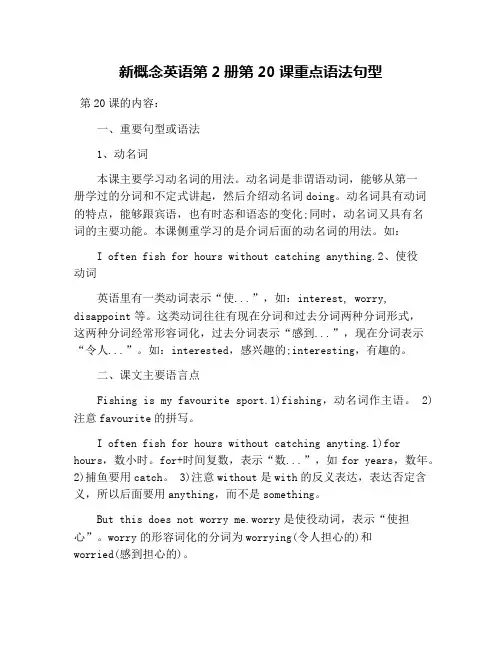
新概念英语第2册第20课重点语法句型第20课的内容:一、重要句型或语法1、动名词本课主要学习动名词的用法。
动名词是非谓语动词,能够从第一册学过的分词和不定式讲起,然后介绍动名词doing。
动名词具有动词的特点,能够跟宾语,也有时态和语态的变化;同时,动名词又具有名词的主要功能。
本课侧重学习的是介词后面的动名词的用法。
如:I often fish for hours without catching anything.2、使役动词英语里有一类动词表示“使...”,如:interest, worry, disappoint等。
这类动词往往有现在分词和过去分词两种分词形式,这两种分词经常形容词化,过去分词表示“感到...”,现在分词表示“令人...”。
如:interested,感兴趣的;interesting,有趣的。
二、课文主要语言点Fishing is my favourite sport.1)fishing,动名词作主语。
2)注意favourite的拼写。
I often fish for hours without catching anyting.1)for hours,数小时。
for+时间复数,表示“数...”,如for years,数年。
2)捕鱼要用catch。
3)注意without是with的反义表达,表达否定含义,所以后面要用anything,而不是something。
But this does not worry me.worry是使役动词,表示“使担心”。
worry的形容词化的分词为worrying(令人担心的)和worried(感到担心的)。
Some fishermen are unlucky.1)注意fisherman的拼写和复数。
2)注意unlucky的构词,即由“un-+luck+-y”构成。
Instead of catching fish,they catch old boots and rubbish.1)instead of,相反、反之。
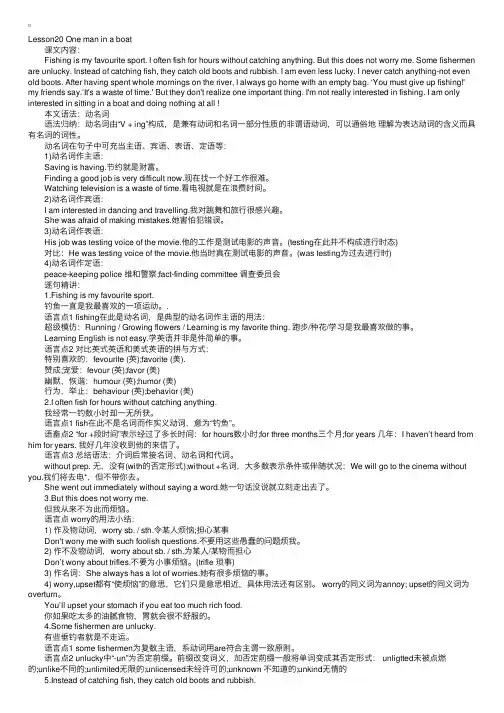
Lesson20 One man in a boat 课⽂内容: Fishing is my favourite sport. I often fish for hours without catching anything. But this does not worry me. Some fishermen are unlucky. Instead of catching fish, they catch old boots and rubbish. I am even less lucky. I never catch anything-not even old boots. After having spent whole mornings on the river, I always go home with an empty bag. ‘You must give up fishing!' my friends say.‘It's a waste of time.' But they don't realize one important thing. I'm not really interested in fishing. I am only interested in sitting in a boat and doing nothing at all ! 本⽂语法:动名词 语法归纳:动名词由“V + ing”构成,是兼有动词和名词⼀部分性质的⾮谓语动词,可以通俗地理解为表达动词的含义⽽具有名词的词性。
动名词在句⼦中可充当主语、宾语、表语、定语等: 1)动名词作主语: Saving is having.节约就是财富。
Finding a good job is very difficult now.现在找⼀个好⼯作很难。
Watching television is a waste of time.看电视就是在浪费时间。
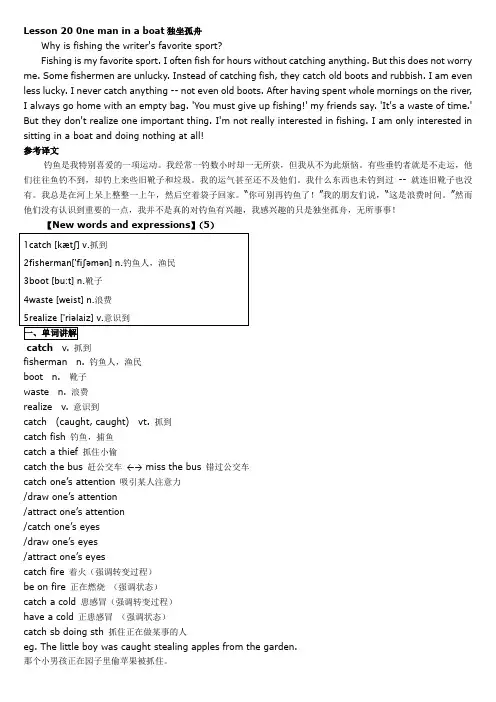
Lesson 20 0ne man in a boat独坐孤舟Why is fishing the writer's favorite sport?Fishing is my favorite sport. I often fish for hours without catching anything. But this does not worry me. Some fishermen are unlucky. Instead of catching fish, they catch old boots and rubbish. I am even less lucky. I never catch anything -- not even old boots. After having spent whole mornings on the river, I always go home with an empty bag. 'You must give up fishing!' my friends say. 'It's a waste of time.' But they don't realize one important thing. I'm not really interested in fishing. I am only interested in sitting in a boat and doing nothing at all!参考译文钓鱼是我特别喜爱的一项运动。
我经常一钓数小时却一无所获,但我从不为此烦恼。
有些垂钓者就是不走运,他们往往鱼钓不到,却钓上来些旧靴子和垃圾。
我的运气甚至还不及他们。
我什么东西也未钓到过-- 就连旧靴子也没有。
我总是在河上呆上整整一上午,然后空着袋子回家。
“你可别再钓鱼了!”我的朋友们说,“这是浪费时间。
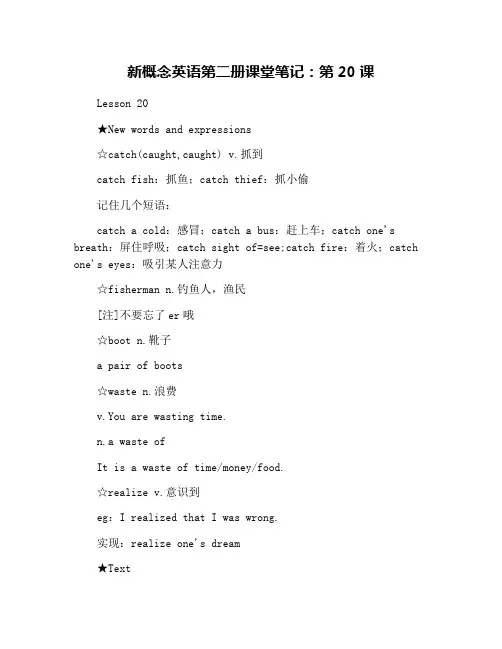
新概念英语第二册课堂笔记:第20课Lesson 20★New words and expressions☆catch(caught,caught) v.抓到catch fish:抓鱼;catch thief:抓小偷记住几个短语:catch a cold:感冒;catch a bus:赶上车;catch one's breath:屏住呼吸;catch sight of=see;catch fire:着火;catch one's eyes:吸引某人注意力☆fisherman n.钓鱼人,渔民[注]不要忘了er哦☆boot n.靴子a pair of boots☆waste n.浪费v.You are wasting time.n.a waste ofIt is a waste of time/money/food.☆realize v.意识到eg:I realized that I was wrong.实现:realize one's dream★TextOne man in a boatFishing is my favourite sport.I often fish for hours without catching anything.But this does not worry me.Some fisherman are unlucky.Instead of catching fish,they catch old boots and rubbish.I am even less lucky.I never catchanything-not even old boots.After having spent whole morning on the river,I always go home with an empty bay.'You must give up fishing!'my friends say.'It's a waste of time.'But they don't realize one important thing.I'm not really interested in fishing.I am only interested in sitting in a boat and doing nothing at all!●本课的重点是-ing形式☆fish n.鱼:一般情况下作为不可数名词用eg:I have bought some fish.在表示种类时为可数名词eg:There are a lot of fishes in the sea.v.钓鱼-->n.fishing主语通常由名词和代词充当。
逐句精讲新概念英语第二册:第20课独坐孤舟Lesson20 One man in a boat课文内容:Fishing is my favourite sport. I often fish for hours without catching anything. But this does not worry me. Some fishermen are unlucky. Instead of catching fish, they catch old boots and rubbish.I am even less lucky. I never catch anything-not even old boots.After having spent whole mornings on the river, I always go home with an empty bag. ‘You must give up fishing!' my friends say.‘It's a waste of time.' But they don't realize one important thing. I'm not really interested in fishing. I am only interested in sitting in a boat and doing nothing at all !本文语法:动名词语法归纳:动名词由“V + ing”构成,是兼有动词和名词一部分性质的非谓语动词,可以通俗地理解为表达动词的含义而具有名词的词性。
动名词在句子中可充当主语、宾语、表语、定语等:1)动名词作主语:Saving is having.节约就是财富。
Finding a good job is very difficult now.现在找一个好工作很难。
新概念英语第二册第二十课课后习题答案详解Lesson 201. b根据课文第4行I never catch anything---not even old boots, 只有b. nevercatches anything 与课文实际内容相同,而其他3个选择都与课文内容不符。
根据课文最后一句I am only interested in sitting in a boat and doing nothingat all! 只有c. doing nothing 是正确答案,而其他3个选择都不符合课文内容。
本句是对主语提问的,回答是. who (谁)是对主语提问的;c. whom(谁)是对宾语提问的;d. whose(谁的)确是对定语提问的;只有b. which 是对做主语的事物提问的,所以选b.本句是带never的否定句,只有b. anything 可以用在否定句中。
而a. nothing若用在否定句中,就会使原句变成肯定意义的句子,不符合题目意思;c. something 只能用于肯定句中;d. everything也不能用在否定句中。
前面句子I am even less lucky 中的less(不及)是表示否定意义的比较级,只有c. not so是表示否定意义的,而其他3个选择都没有否定的意思.只有b. an empty bag 最符合语法。
而其他3个选择都有语法错误。
a. a empty bag 中empty是以元音开头的,前面不能用a 而应该用an;c. empty bag 中bag 是可数名词,需要用an 来修饰;d. oneempty bag 不符合习惯用法,单数可数名词前通常用不定冠词a 或an 修饰,除非表示强调才用one 修饰。
因此应该选b.只有 c. all 才能使这个句子同前一句I am only interested in doingnothing.的含义相符合,all等于the things that ,可以代替doing nothing. 而其他3个选择中a. only 和d. the only 不符合语法,b. the one 不符合题目意思,不能完全表达清楚。
单词学习catch (caught, caught) vt. 抓到catch fish 钓鱼,捕鱼catch a thief 抓住小偷catch the bus 赶公交车←→miss the bus 错过公交车catch one’s attention 吸引某人注意力/draw one’s attention/attract one’s attention/catch one’s eyes/draw one’s eyes/attract one’s eyescatch fire 着火(强调转变过程)be on fire 正在燃烧(强调状态)catch a cold 患感冒(强调转变过程)have a cold 正患感冒(强调状态)catch sb doing sth 抓住正在做某事的人eg. The little boy was caught stealing apples from the garden.那个小男孩正在园子里偷苹果被抓住。
eg. The early bird catches the worm. 捷足先登。
grab 抓起,抢夺,热切或拼命地抓snatch 抢夺,突然而迅速地抓起arrest (依法)逮捕capture 俘虏,捕获trap 设陷阱捕捉grasp 紧握,抓住seize [si:z] 握紧,抓住catch it 被责骂,受处罚(口)(通常与will等连用)eg. If I come home late, I’ll catch it from my mother. 如果我回家晚了,我妈妈会骂我。
catch up with 赶上eg. Go ahead, please. I’ll soon catch up wi th you. 你先走吧,我会很快赶上你的。
catch on (意见,时尚)受欢迎的catch phrase 标语,引人注意的句子fisherman n. 钓鱼人,渔民fish →fisherman (pl. fishermen)fish n. 鱼[C]1) fish 鱼[pl.] 单复数同形2) fishes 不同种类的鱼a big fish in a small pond. 山中无老虎猴子称霸王eg. When the cat is away, the mice will play. 老猫不在家老鼠笑呵呵。
teach fish to swim 班门弄斧drink like a fish 牛饮like a fish out of water 如鱼离水an odd fish 奇怪的家伙eg. They caught many fish that morning. 那天早上他们钓了很多鱼。
eg. He studies the fishes in the Indian Ocean. 他研究印度洋里的鱼类。
fried fish 煎鱼,炸鱼fresh fish 新鲜鱼salted fish 咸鱼fish-and-chips 油煎鱼加炸马铃薯片(大众快餐)(Br.)eg. Some people eat fish on Fridays.(天主教的习惯在星期五吃鱼代替吃肉)fish vi. 捕鱼,钓鱼eg. I like fishing. 我喜欢钓鱼。
eg. I enjoy fishing. 我喜欢钓鱼。
eg. I am fond of fishing. 我喜欢钓鱼。
eg. I am keen on fishing. 我喜欢钓鱼。
go fishing 去钓鱼go swimming 去游泳go shopping 去购物fish in troubled water 浑水摸鱼fish for compliments 沽名钓誉boot n. 靴子a pair of boots 一双靴子have one’s heart in one’s boots 极为悲观消沉have one’s heart in one’s mouth 极为恐惧boots 长筒靴rubber boots 橡胶长靴running shoes 跑鞋platform shoes 厚跟鞋leather shoes 皮鞋sandal ['sændl] n.凉鞋sneaker ['sni:kə] n.(帆布胶底)运动鞋(Am.)slipper 拖鞋moccasin ['mɔkəsɪn] n.(原为北美印第安人穿的无后跟)软皮平底鞋,莫卡辛鞋tennis shoes 网球鞋loafer 平底便鞋shoesshoelace 鞋带sole 鞋底heel 鞋跟low shoe 低帮鞋(Am.)high shoe 短靴boot 长靴shoe 低帮鞋(Br.)boot高统鞋waste vt./n. 浪费1) waste vt. 浪费eg. Don’t waste your time, money and energy. 不要浪费你的时间,金钱和精力。
eg. All the efforts were wasted. 一切努力都被浪费了。
2) waste n. 浪费a waste of 对…的浪费eg. It’s a waste of time. 这简直是浪费时间。
eg. It’s a waste of money. 这是对金钱的浪费。
eg. It’s a waste of feeling. 简直是浪费感情。
eg. It’s a waste of food. 这是浪费食物。
Waste not, want not. 不浪费,就不缺乏。
(尤指食物或钱)eg. If you never waste anything, you’ll never lack it. 不浪费,就不缺乏。
go to waste 变成废物waste away (人,体力)衰弱wastebasket 字纸篓(Am.)wastepaper basket字纸篓(Br.)realize v. 意识到real adj. 真的reality n. 现实1) 认识到,意识到(不用于被动语态,不用于进行时态,人做主语)realize one’s mistake 认识到自己的错误/be aware of one’s mistakeeg. She realized that he was lying. 她意识到他正在说谎。
eg. They don’t realize one important thing. 他们没有认识到一件重要的事情。
2) vt. 实现(计划等)(可用于主动,也可用于被动语态)realize one’s hope 实现某人的希望realize one’s dream 实现某人的梦想realize one’s plan 实现某人的计划eg. He realiaed his dream at last. 他终于实现了自己的梦想。
→His dream was realized at last.eg. Her worst fears were realized. 她最担心的事发生了。
come true 成为现实(物做主语,没有被动语态)eg. Her dream has come true.她的梦想实现了。
课文讲解favorite adj. 最喜欢的无比较级、最高级eg. Red and Black is my favorite book. 《红与黑》是我最喜欢的书。
n. 心爱的人(物),最喜爱的东西eg. That song is one of his favorites. 那首歌是他最喜欢的歌中的一首。
eg. She is a favorite with her aunt. 她最受姑姑的宠爱。
/ She is her aunt’s favorite.without prep. 没有prep.+ n./v.—ing / pron.eg. He went out without saying anything. 他一言不发就走了。
用法:without前后必须保持一致。
上句相当于:He went out and he didn’t say anything./ He went out without saying any words.eg. I can not live without you.eg. Fish can not live without water.worry v. 使…担心worry sb 使…担心,困扰某人eg. My little daughter worried me a lot. 我的小女儿令我担心。
be worried about 对…表示担心eg. I was worried about my little daughter. 我对小女儿感到担心。
be anxious about 对…感到焦虑instead of 不做…而做… (可置于句首或句尾)eg. Instesd of catching fish, the unlucky fishermen catch old boots and rubbish.那些不幸的垂钓人没有钓到鱼而钓到一些旧靴子和垃圾。
/ The unlucky fishermen catch old boots and rubbish intead of catching fish. eg. Men wear socks intead of stockings. 男士们穿的是短袜而不是长袜。
eg. I went shopping intead of doing my homework. 我去购物而没有做作业。
instead of 后面加名词,代词或动名词作介词宾语。
rubbish n. 垃圾a pile of rubbish 一堆垃圾/a heap of rubbisheg. Don’t talk rubbish! 别说废话了!garbage1) (厨房里的)菜屑碎肉,残羹剩肴,垃圾(Am.)2) (口)不足取的东西,愚蠢的想法garbage can 垃圾箱(Am.)dustin 垃圾箱(Br.)garbage collector 垃圾收集清洁员dustman 垃圾收集清洁员(Br.)garbage truck 垃圾车dustcart 垃圾车(Br.)refuse ['refju:s] 垃圾even 甚至more lucky 更加幸运less lucky 更加不幸运less 更不…(消极比较级)A is less + 原级thanB A比B更不…eg. I am less happy than before. 我比以前更加不愉快/ 更痛苦。